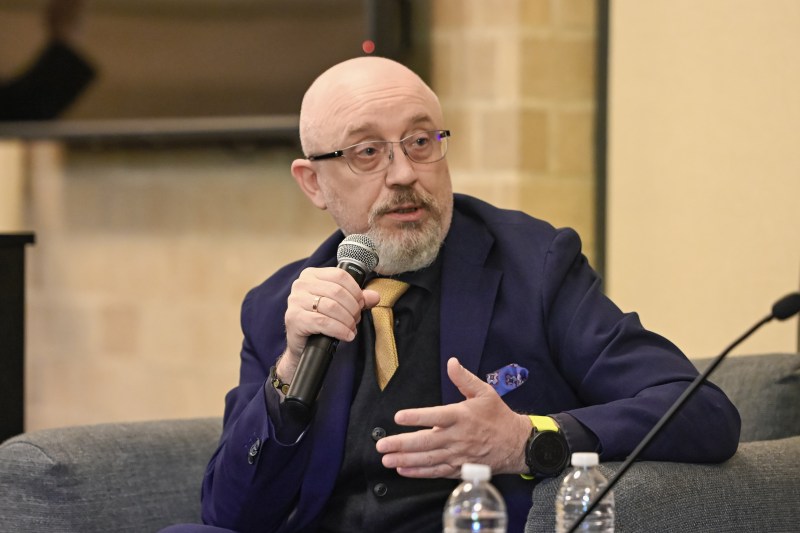The Stanford Center for Russian, East European, and Eurasian Studies (CREEES) hosted a talk with former Ukrainian Minister of Defense, Oleksii Reznikov on Monday afternoon. The event was organized by CREEES Associate Director Jovana Lazic, and the talk was moderated by Steven Pifer, a former U.S. Ambassador to Ukraine.
Reznikov was the Ukrainian Minister of Defense from November 2021 until he was dismissed in September 2023, after President Volodymyr Zelensky announced “new approaches” in military defense. Pifer labeled Reznikov’s contributions as Minister of Defense a “success” because he had helped defy the expectation that Russian forces would defeat Ukraine in a few months.
Prior to the war, Reznikov has been a leading figure in Ukrainian politics, including supporting pro-North Atlantic Treaty Organization (NATO) candidate Viktor Yushchenko during the contested 2004 presidential election.
Reznikov’s opening remarks were about Ukraine’s strength and cognitive warfare: “We have crushed the resources that Russia has been amassing since the Soviet era. The Kremlin’s military potential, which has been a threat to Europe, NATO, and every country of the free world was drastically undermined.”
He thanked the United States and other democracies for providing aid and supplies to Ukraine in its fight against Russia.
He reminded the audience of Russia’s authoritarian agenda. “Autocracies don’t care about casualties…they are using their soldiers, their manpower, as cannon fodder. They use meat grinder tactics. I saw it personally,” Reznikov said. “Our enemy is cruel and inhumane.”
As part of their tactics, Reznikov claimed that Russia has also been using technology, especially artificial intelligence deep-fakes and cyberattacks, to spread disinformation about the war. “The threat of cognitive warfare is increasing,” Reznikov said. Speaking from personal experience, Reznikov and his family were attacked by a Russian online campaign alleging that his daughter had spent funds on luxury real estate.
“TikTok confirmed that it really was a Russian-paid campaign against me. The goal was to drag down support for Ukraine and slow down the allocation of weapons we needed,” he said.
Pifer and Reznikov also spoke about the changing world order. Reznikov insisted on the dangers of ignoring countries he described as a coalition of authoritarian actors: Russia, North Korea, China and Iran. “[The coalition is] interested in changing the world order. They are interested in building the Berlin Wall again. This is why they need to be defeated in Ukraine,” he said.
Following Reznikov’s remarks, he addressed questions from the audience. The audience of about 75 people included Michael McFaul ’86 M.A. ’86, director of the Freeman Spogli Institute and the former U.S. ambassador to Russia, as well as military officers, students and Stanford scholars with family members in Ukraine.
When asked about the massive population imbalance between Ukraine and Russia, Reznikov compared the war to the story of David and Goliath.
“Goliath was a monster. David was small but smart and creative … We will compete using technology, mind, and creativity,” Reznikov said, as he promoted Ukraine’s recent engineering research to defend against long range missiles and successful attacks on Russian ships in the Black Sea.
Given Ukraine’s recent military successes, Reznikov warned the world not to underestimate Ukraine: “A lot of people saw that it would be a war between ‘big Soviet Army’ and ‘small Soviet Army.’ This is a mistake. We are not a ‘small Soviet Army.’ We are a modern Ukrainian Army!”
Reznikov concluded by advocating against “fatigue syndrome” and urged the audience to support Ukraine. He called on the audience to pressure members of Parliament and Congress to remember Ukraine and its role in fighting autocratic regimes.
“This war is not the war between Russia and Ukraine. It’s an existential war between democracy and autocracy,” he said.
